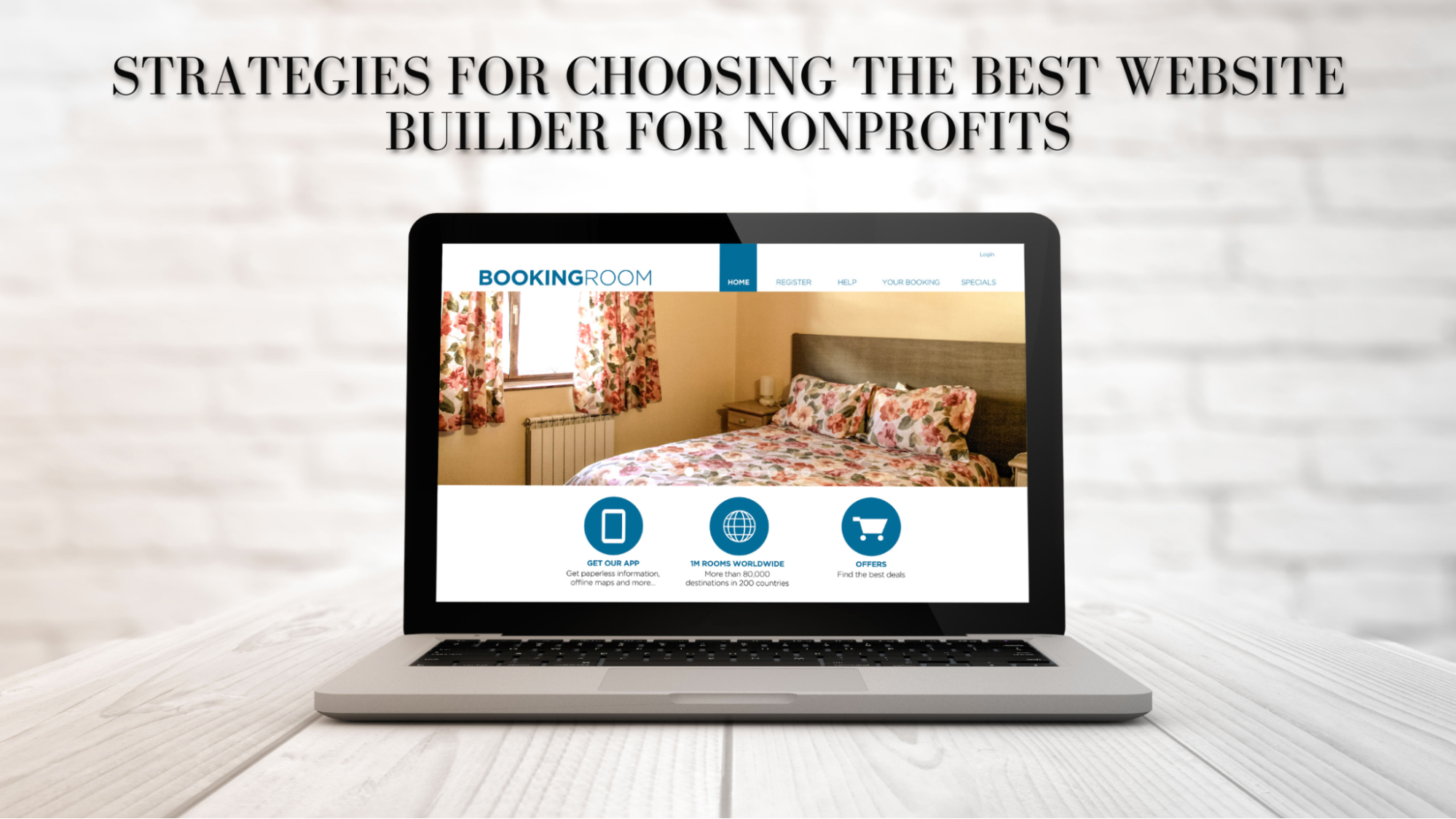Choosing the right website builder for your nonprofit is crucial as it can significantly impact your organization’s online presence, engagement, and fundraising capabilities. With numerous options available, focusing on the features that best serve your needs is essential. This comprehensive guide will help you navigate the decision-making process and choose a website builder that aligns with your nonprofit’s goals and resources.
Why Does Your Nonprofit Need a Website Builder?
An effective online presence is crucial for nonprofits to reach their audience, share their mission, and drive donations. A website builder is vital for this purpose, enabling nonprofits to create a professional, user-friendly site without extensive technical expertise.
– A well-designed website serves as the hub of your online activities.
– It offers a platform to communicate your story, showcase your impact, and engage supporters.
– Facilitates online donations, volunteer sign-ups, and event registrations, making it easier for people to contribute.
– Provides essential features like mobile responsiveness, SEO tools, and integration with social media and email marketing platforms.
– Helps broaden your reach and improve your visibility.
– Enables your nonprofit to create a compelling online presence that attracts and retains supporters.
– Ultimately advances your mission by strengthening your online engagement and outreach.
How to Choose the Best Website Builder for Nonprofits?
When choosing a website builder for your nonprofit, consider your organization’s specific needs and long-term goals. Begin by evaluating the platform’s ease of use, customization options, and integration capabilities to ensure it meets your operational needs.
Additionally, look for features that support fundraising efforts, such as donation processing and email marketing tools. Security and compliance with data protection regulations are also crucial factors. To make an informed decision, explore the best website builders for nonprofits that offer the right balance of affordability, functionality, and support, ensuring your online presence effectively serves your mission.
Identifying Your Nonprofit’s Specific Needs and Goals
Understanding Key Requirements
Before diving into website builders, define what you want your website to achieve. Most donors are significantly influenced by a nonprofit’s website, and their decision to donate often depends on the impact it creates. Your website should effectively support your primary objectives, whether it’s fundraising, volunteer management, or awareness campaigns.
Before approaching an agency for website design, here are the key questions to ask:
– What are the main goals of your website?
– How will your website support your fundraising efforts?
– What features are essential for managing volunteers?
Audience Considerations
Understanding your target audience is crucial for selecting a website builder that meets their needs and preferences. 75% of users judge a nonprofit’s credibility based on its website design. Tailoring your website’s features and design to your audience enhances engagement and credibility.
Considerations for Your Audience:
– What design elements appeal to your target audience?
– How can you ensure your website is accessible to all users?
– What content will resonate most with your audience?
Scalability and Growth
Select a platform that can grow with your organization. As your nonprofit grows, your website needs may evolve. As nonprofits enhance their digital presence, selecting a scalable platform that accommodates future growth and evolving needs is crucial..
Evaluating User-Friendly Design and Ease of Use
Importance of an Intuitive Interface
A user-friendly interface is essential for efficient website management. A user-friendly platform can significantly reduce website management time, allowing your team to focus on core activities Look for platforms with a straightforward, easy-to-navigate interface.
Features to Look For:
– Drag-and-drop functionality
– Easy-to-use editing tools
– Simple content management system
Customization Options
Customizable templates are crucial for showcasing your nonprofit’s unique branding and mission. Organizations that use customizable templates see an increase in visitor engagement. Ensure the website builder you choose offers flexibility in design and layout.
Regarding customization, having a wide variety of templates and design options is essential. The ability to adjust colors, fonts, and layouts allows for a more personalized and unique look. Support for custom graphics and multimedia also enhances the design and functionality, providing more creative control over your project.
Mobile Responsiveness
With over 60% of web traffic coming from mobile devices, having a mobile-friendly design is essential When selecting a website builder, ensure it offers responsive templates that adapt seamlessly to different screen sizes. Look for features like mobile-friendly navigation, buttons that are easy to use on smaller screens, and fast loading times to ensure an optimal experience for mobile users.
Assessing Cost-Effectiveness and Budget Alignment
Budget Planning for Nonprofits
Nonprofits often work with tight budgets, so finding a website builder that fits within your financial constraints is essential. By choosing a platform that offers nonprofit discounts, you can save an average of 30% on website costs.
When evaluating costs, consider the availability of nonprofit discounts, which can significantly reduce expenses. Additionally, factor in the cost of any additional features or services you may need. Exploring potential savings on long-term plans can also be beneficial, as many providers offer discounts for extended commitments, helping to manage your budget more effectively.
Free vs. Paid Plans
While free plans might be tempting, most nonprofits find that paid plans offer better features and user experiences. Assess the benefits of paid plans against your needs and budget to make an informed decision.
| Aspect | Free Plans | Paid Plans |
| Limitations | Often come with restrictions | Fewer or no limitations |
| Additional Features | Basic features included | Advanced features and enhancements |
| Long-Term Value | Limited long-term benefits | Greater value and continuous support |
Cost vs. Value
Investing in a quality website builder can result in a 300% return on investment by boosting donations and volunteer sign-ups. It’s essential to strike a balance between cost and value to maximize your return. When considering value, look for features that enhance fundraising and engagement, ensure the plan includes ongoing support and updates, and evaluate the potential for increased donations and volunteer involvement.
Prioritizing Security and Data Protection
Importance of SSL and Secure Hosting
Security is essential for protecting donor information and establishing trust with your audience. Websites equipped with SSL certificates not only secure data transmission but also significantly increase donor trust. It’s vital to ensure that your website builder provides secure hosting and includes SSL certification to safeguard your site from cyber threats.
Compliance with Legal Requirements
Adhering to regulations like GDPR is critical for protecting donor data and maintaining your organization’s credibility. It’s essential to choose a platform that supports compliance with relevant data privacy laws. This ensures that your organization remains trustworthy and legally compliant, especially when managing user data and privacy.
Regular Updates and Support
Selecting a platform that offers ongoing updates and reliable customer support is key to maintaining a secure and efficient website. Make sure your chosen website builder provides consistent updates, responsive customer support, and a wealth of online resources to help you address any challenges that arise.
Exploring Integrations and Third-Party Compatibility
Essential Integrations for Nonprofits
Integrating with donation platforms, email marketing tools, and social media is crucial for enhancing your nonprofit’s online presence and operational efficiency. When choosing a website builder, ensure it supports these key integrations to streamline your operations and maximize your outreach efforts.
Third-Party Tool Compatibility
It’s important to select a platform that seamlessly integrates with the third-party tools your nonprofit currently uses or plans to implement. Compatibility with existing tools not only improves efficiency but also reduces the need for additional software, making your workflow more streamlined and effective.
Automation Features
Automation can significantly save time and resources by handling repetitive tasks efficiently. Opt for a website builder that offers robust automation features, enabling you to streamline processes such as email campaigns, donor follow-ups, and social media management, ensuring your nonprofit runs smoothly with minimal manual intervention.
Comparison Table of Top Website Builders for Nonprofits
| Feature | Wix | WordPress | Squarespace | Weebly |
| Ease of Use | High | Moderate | High | High |
| Customization Options | Extensive | Extensive | Moderate | Moderate |
| Mobile Responsiveness | Yes | Yes | Yes | Yes |
| Free Plan | Yes | Yes (Self-Hosted) | No | Yes |
| Paid Plans | Starts at $14/month | Varies (Hosting + WP) | Starts at $16/month | Starts at $6/month |
| SSL Certificates | Included | Available (Add-on) | Included | Included |
| Security Features | Robust | Depends on Hosting | Robust | Robust |
| Integrations | Good | Excellent | Good | Good |
FAQs
- What are the most important features to look for in a website builder for nonprofits?
When selecting a website builder for nonprofits, prioritize ease of use, customization options, mobile responsiveness, and robust security features. Integrations with donation platforms and social media are also crucial.
- Is it better to choose a free website builder plan for a nonprofit, or invest in a paid plan?
While free plans are appealing for nonprofits with tight budgets, paid plans often offer better features, fewer limitations, and greater long-term value. Evaluate your nonprofit’s needs and potential growth to make an informed decision.
- How can I ensure that the website builder I choose will support my nonprofit’s future growth?
Opt for a platform that provides scalability, with options to upgrade plans and add features as your nonprofit grows. Look for builders that regularly update their offerings and provide excellent customer support to accommodate future needs.































